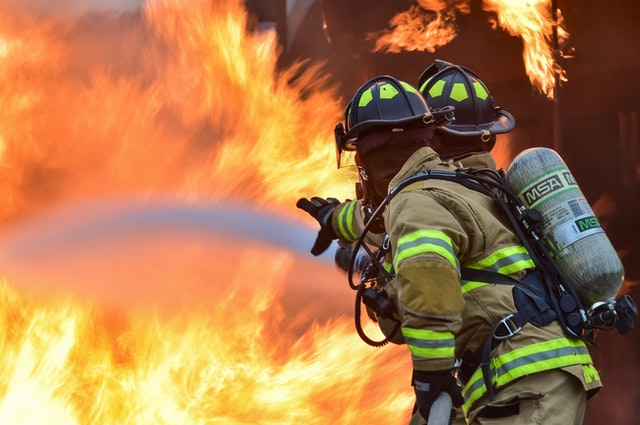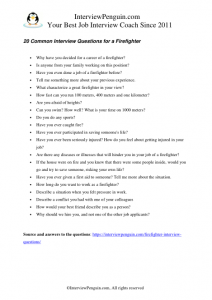I want to be a firefighter! Many of us has nursed the same dream in our childhood. Helping the others while fighting the elements of nature has always attracted men of all ages, when thinking about their professional career. However, once we reach our adulthood, we understand that it is not easy to become a firefighter. And, regretfully, many of us forget to dream. We content ourselves with whatever life throws at us, not expecting much from our existence.
But you should dare to dream. Life is to be lived, and dreams to be pursued. Winning or losing is a part of a good fight–just fleeing from the fight is not (or from the fire?). The success in the interview for this position depends on three things:
- You have to demonstrate great physical condition, and readiness for the physical aspect of the job.
- You have to pass the firefighter exam (or an alternative exam, in your state or country). Check the following link for 400+ practice questions & answers for a firefighter exam. Preparing for the questions in advance and doing the practice tests is a proven way of eventually passing the real test, and you should not underestimate this one…
- You have to show the correct motivation and the right attitude in your answers to the questions of the interviewers.
What do they try to understand with their questions?
First and foremost, they try to understand your personality. Are you ready to risk your life for saving someone’s else life? Would you take a risk for your colleague? And are you a team player? Would you not panic in a difficult situation? Can you make an independent decision? Are you responsible? Can we count on you when things go wrong?
Various questions will help the interviewers to get a good grasp of your personality. They may (and most of the time they will) use a an aptitude exam (personality test), to confirm their initial impression about your character and personality. Let’s have a look at some of the questions, and how you should answer them.
Common questions for firefighter interviews
- Why have you decided for a career of a firefighter? (Feel free to talk about your childhood dreams. Tell us how you feel good about helping someone, about the calling you feel in your heart. Tell us about the meaningful purpose which you see in this job.)
- Is anyone from your family working on this position? (Narrate your experience, and how this person became your role model–if they did become one.)
- Have you even done a job of a firefighter before? (Perhaps you worked as a volunteer firemen, and if not, perhaps you at least took part in a course, or competition that imitated the condition of a real firefighter job. One way or another, speak about your experience with enthusiasm, and point out both beautiful and difficult aspects of this job.)
- Tell me something more about your previous experience. (Have you helped to save someone’s life, or a property? Tell them that you felt grateful for the opportunity, and happy with yourself while working as a firefighter. Everyone like stories. Narrate a good true story about your firefighting experience.)
- What characterize a great firefighter in your view? (Sense for responsibility, readiness to risk their life for other people, teamwork ability, good physical condition, discipline, etc.)
- How fast can you run 100 meters, 400 meters and one kilometer? (They will likely let you run afterwards, so try to be realistic about your predictions. It is better to be humble and surprise them positively on track.)
- What motivates you the most in this job?
- Are you afraid of heights? (The answer to this one is obvious–good firefighter should be afraid of neither heights nor depths.)
- Can you swim? How well? What is your time on 1000 meters? (Again, try to stay humble in your answer. You will get a chance to prove your swimming skills in a swimming pool later.)
- Do you do any sports? (Good physical condition is crucial for the job of a firefighter. Talk about your passion for movement and physical activity.)
- Have you ever caught fire?
- Have you ever participated in saving someone’s life? (Narrate your experience in detail. Try to show us that you did not panic, and did what you could to help the person–regardless of the final outcome.)
- Have you ever been seriously injured? How do you feel about getting injured in your job? (The key is to show them that you are not afraid of getting injured, that you know it can happen to a firefighter.)
- Are there any diseases or illnesses that will hinder you in your job of a firefighter? (In many countries, firefighters have to pass an initial medical test, before they are accepted for the job. Speak honestly about your problems and illnesses, but at the same time, ensure them that they do not prevent you from becoming a great firefighter.)
- If the house were on fire and you knew that there were some people inside, would you go and try to save someone, risking your own life? (Yes, you would. At least you should say this in an interview. And if you are not sure if you would do that, than you should reconsider your idea of working as a firefighter. Having said that, it is always important to evaluate the risk–sometimes the fire is so strong and the house in such a condition that it is impossible to save anyone. In such a case it makes no sense to go inside and die…)
- Have you ever given a first aid to someone? Tell me more about the situation. (Another chance to demonstrate that you stay calm in difficult situations. Tell them what you did, step by step, giving the first aid to an injured person.)
- How long do you want to work as a firefighter? (Most people have this job for years, but there is an age limit, typically 30, or 35 years of age–depending on the country of your application. Consider how old you are, and adjust your answer accordingly. Needless to say, it makes no sense to claim you’d like to have the job until your fifties, since it isn’t possible.)
- Describe a situation when you felt pressure in work. (Try to narrate a situation that had a happy ending–one when you managed the pressure. They key is to show the interviewers that you stay level-headed in difficult situations, that you do not panic under pressure.)
- Describe a conflict you had with one of your colleagues. (Conflicts have no place in this job. Try your best to convince us that you always avoid conflicts, that you try to act in a friendly and respectful manner to all your colleagues.)
- How would your best friend describe you as a person? (Likely they will not contact your best friend, so you can say whatever you want at this point. Good listener, a person you one rely on, selfless, a team player, etc are some of the good characteristics to mention in your answer.)
- Why should we hire you, and not one of the other job applicants?
Special Tip: Download a full list of questions in .PDF format, and practice your answers before the start of your interview:
Conclusion and next steps
Firefighter interview belongs to interviews with average difficulty. You can prepare for the questions in advance, with the help of Interview Penguin, and most of a time, only a few other applicants will compete with you for the position.
On the other hand, you have to demonstrate right attitude to work and danger, as well as that you have a good enough physical condition to handle the job, to pass the physical trials.
And you have to pass the firefighter exam. I hope that I helped you get ready for the questions. To get ready for the exam and all the tricky math reasoning and verbal reasoning questions, check the following preparation kit (the biggest collection of 90+ practice tests for firefighters online). Thank you, and good luck in your interview!
Matthew
Continue your preparation for one of the most important meetings of your life:
- How to overcome interview nerves – Stress can kill your chances in a firefighter job interview. Learn how to overcome it now.
- Fifteen most common interview questions – Test the waters, learn what matters for the interviewers and how to answer the most common questions. Useful read for everyone who has little experience with interviewing for jobs.


